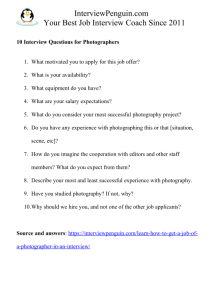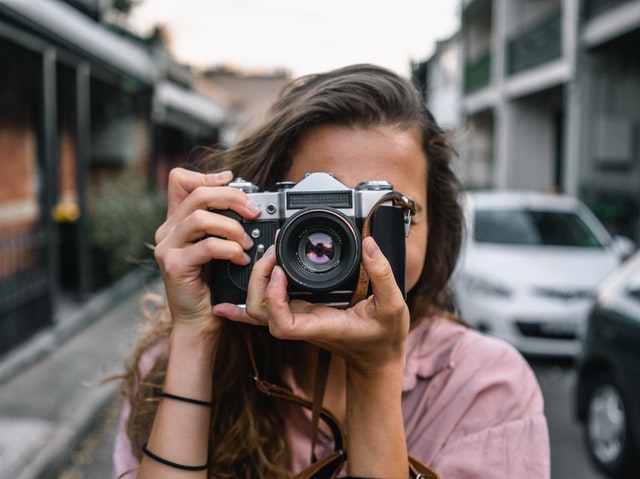Most photographers, similarly to other artists, will typically prefer a freedom of a freelancing career to a routine of as job. But not everyone wants to deal with advertising, acquiring new clients, online marketing, purchasing new equipment, and other duties that necessarily belong to a career of a freelance photographer.
Some people prefer to have a job. Get a place and time, arrive, and make the pictures. Simply not bother with anything else than the core of their art. What is more, even freelancers will often find themselves interviewing for a job–especially when they look to establish a long term partnership with bigger clients, such as a publishing houses, marketing agencies, or other businesses.
What will happen in this interview? What questions will they ask you? And what will make the difference at the end? We will try to find the answers in this article, starting with the questions.
Table of Contents
What motivated you to apply for this job offer/gig for a photographer?
Maybe you find the payment attractive, or the setting you will shoot at, or the models. Nevertheless, you should focus mostly on other things in your answers. Say them that you have experience with similar photo shoots, that you have all necessary equipment to make great pictures in a given setting.
You may also compliment them (honest compliment will never hurt in an interview), saying that you are impressed with the work of their agency/publishing house, and that it will be a pleasure to work for them. One way or another, they should feel that you do not apply just because you need to earn money.
What is your availability?
If you apply for a job with a local newspaper, or a local agency, one of the most important things for them will always be your flexibility. They may often call you at a last notice, sometimes in the evening, or even in the night, and ask you to follow one of their reporters to make pictures on site.
Of course, you should not promise them something you can not fulfill. If you have children, or work with some other clients, or if you basically do not want to work in the night, you should clearly explain your (in)availability. But if you are still living on your own, and consider this an important opportunity to kick-start your career, you can tell them that you are available anytime they need you. If you have a car, mention it in your answer.
What equipment do you have?
A good answer to this question depends on the person who interviews you, and the situation. When they have little knowledge of photography and technical terms, you better avoid excessive terminology in your answer. Just describe your best camera, and the lenses and filters you have, and ensure them that you are ready to capture great pictures in all situations.
When you talk to a technician, head photographer, or anyone else who understands photography, you can go into technical details. Show them that you are serious about your work, and understand the latest equipment and technique.
What are your salary expectations?
Photographer is not a bank teller, manager, teacher, or a cashier. There is nothing like a standard starting salary for this job, and the averages do not really matter when we speak about particular contracts and gigs.
The best thing you can do in this case is asking them to make the first offer. Tell them that you do not know what their budget is, and how many hours they will need you, and what work you will be supposed to do after the shooting.
Now two things can happen. Either they make the offer (which is great, since you can react to it, giving an explanation why you need them to pay you more, or basically just accepting the offer), or they will describe the details of the deal and ask you to make an offer.
Be careful with your proposal in the second situation. Most people can’t tell a good photographer from an excellent one. Many times they will hire the one who makes them the best offer. That’s just the reality of 21st century and tight budgets…
Perhaps this is a crucial contract for you, something that will help you greatly in your career of a photographer, something that will shine on your portfolio. In such a case you should ask for less, and accept even the offer that is below your standards. Think also about the future–having this contract can pay off big time in a year or two… You can check also 7 sample answers to “What is your desired salary?“, if you’re still not sure how to approach this one.
What do you consider your best shooting and why?
To see something once is better than to hear about it a thousand times. You should open your laptop at this point, and show them your portfolio (more on it later in the article). The key is to focus on more than aesthetic in your description of your best shooting. Try to think about it from business point of view.
Did the pictures you took stand out in some marketing campaign, on a cover of the magazine? Or did they attract huge engagement on social media? Did you employer make a big profit with the help of your pictures? Try to refer to these things in your answer. The interviewer should get an impression that you always think about the business perspective as well…
Other questions you may face in your photographer job interview.
- Do you have any experience with shooting this or that [situation, scene, etc]?
- How do you imagine the cooperation with editors and other staff members? What do you expect from them?
- Describe your most and least successful experience with photography.
- Have you studied photography? If not, why?
- Why should we hire you, and not one of the other photographers who also try to get the gig?
Portfolio–the cornerstone of your success
In many other careers, portfolio is a nice bonus, something that can help you win a job contract. In photography it is a must. Unless you have a great portfolio in your interview, that means a collection of your best pictures, ideally relevant to the job you try to get, it makes no sense to leave your house and travel to the site at all.
Look at your portfolio, pick a few pictures or collections most relevant for the job you try to get, and think what you will say about them in the interviews. In nine out of ten cases you will talk about your past works with the hiring managers, so it is important to prepare for the talk…
Final thoughts
Interview for a job of a photographer can hardly be compared to any other job interview. You may get only a few questions, or even no questions at all–if your portfolio is convincing enough, and if they do not interview other people for the same position.
Prepare for the questions, and learn how to present your work in a right way, so the employer can see the value you can bring onboard, once they hire you.
And think also about the future. Maybe you won’t earn as much as you originally expected in this job, but just seeing your name on the pages of that newspapers, or webpages of that particular advertising agency, will open you doors to other, more lucrative contracts and deals. I wish you good luck in your interview!
Matthew
May also interest you:
- Journalist interview questions.
- How to overcome interview nerves – Feeling nervous before your meeting with the employer? Check our 4 simple strategies on overcoming interview nerves, and make sure that you won’t remain silent when facing their questions.
- Tell us about a time when you felt overwhelmed with work.
* You can also download the list of questions in a one page long PDF, and practice your interview answers anytime later:


